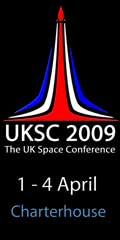Tau Zero practitioner Kelvin Long has organized an interstellar session at the forthcoming 2009 UK Space Conference, which will take place from April 1 to 4 at Charterhouse School, near Godalming Surrey. The overall conference looks to be an excellent one, with symposia on rocket technology, panels and presentations on astronomy and space science, much educational material for teachers and students, and the presentation of the Arthur Clarke Awards on the evening of the 4th.

From our perspective, of course, it’s good to see the Tau Zero logo up on the site’s interstellar page, with links to all presentations. Long is a scientist in the plasma physics industry who will address inertial confinement fusion and antimatter-catalyzed fusion for space propulsion. You’ll recall that inertial confinement was the propulsion system of choice for the Project Daedalus starship design created by members of the British Interplanetary Society. Antimatter-catalyzed fusion interests me in light of recent work on harvesting antimatter in space, which suggests a way of augmenting our tiny stores of the stuff.
The agenda for the interstellar session should be firm by now, but you can keep up with any last-minute changes on the site. Here’s what is currently listed:
- Claudio Maccone will be discussing ‘Realistic Targets for Early Interstellar Missions,’ with an eye on the Sun’s gravity focus as a sensible first step before launching probes toward nearby stars. The huge magnification offered by using the gravity lens would make it possible to study and characterize any target system long before a star probe would be designed, much less launched, to that destination.
- Aerospace engineer Luca Derosa (CEO of the Italian company iMEX.A) will be examining velocity profiles for a relativistic space journey in ‘Relativistic Engineering for Interstellar Missions.’
- My interstellar bet partner, the physicist Tibor Pacher, will present ‘Unconventional Thinking in Interstellar Spaceflight Research: Practical Approaches,’ which gets into challenging questions on how to present propulsion research to the public while ensuring scientific rigor.
- Space engineer Mike McCulloch (University of Plymouth) will look at the Pioneer anomaly and other spacecraft trajectory questions, discussing a model that could allow for reduction of the inertial mass of a spacecraft. The paper is ‘The Possibility of Inertial Reduction for Interstellar Travel.’
- Remo Garattini (University of Bergamo) will address the concept of wormholes and the question of their stability in the context of Casimir forces in ‘The Use of Casimir Energy for Traversable Wormholes.’
I’m unable to be in the UK for this conference, but here’s hoping those with an interstellar interest in Britain and nearby countries will be able to swell the ranks to hear topics that range from established physics to cutting-edge speculation. I’m hoping that, as occurred at last year’s IAC conference in Glasgow, some or all of these presentations will be made available through the Net.


Hi Folks;
Does anyone know how much Casimar energy we are talking about regarding Remo Garattini ‘s(University of Bergamo) scheme to use Casimar energy to hold open wormholes?
I have read of various reports involved in using energy of various types to hold open wormholes wherein the range of required energy differs by many orders of magnitude depending on the scheme and the source of the information. I cannot seem to find a consensus on the energy required to hold open a wormole, much less a wormhole of human transportable scale.
Thanks;
Jim
April 10, 2009
Small Engine For the Big Job of Testing Theory of Relativity
Written by Nancy Atkinson
The FEEP. Credit: ESA
Researchers from the European Space Agency are testing what they describe as the smallest, yet most precisely controllable engine ever built for space.
Measuring 10 centimeters (4 inches) across and making a faint blue glow as it runs, the Field Emission Electric Propulsion, or FEEP, engine produces an average thrust equivalent to the force of one falling hair.
But its thrust range and controllability are far superior to more potent thrusters, and will be important for a future space mission that will test Einstein’s General Theory of Relativity.
“Most propulsion systems are employed to get a vehicle from A to B,” explained Davide Nicolini of the agency’s Scientific Projects Department, in charge of the engine research. “But with FEEP, the aim is to maintain a spacecraft in a fixed position, compensating for even the tiniest forces perturbing it, to an accuracy that no other engine design can match.”
http://www.universetoday.com/2009/04/10/small-engine-for-the-big-job-of-testing-theory-of-relativity/
Hi Folks;
Does anyone know how much Casimar energy we are talking about regarding Remo Garattini ’s(University of Bergamo) scheme to use Casimar energy to hold open wormholes?
I have read of various reports involved in using energy of various types to hold open wormholes wherein the range of required energy differs by many orders of magnitude depending on the scheme and the source of the information. I cannot seem to find a consensus on the energy required to hold open a wormole, much less a wormhole of human transportable scale.
I have read of various reports involved in using energy of various types to hold open wormholes wherein the range of required energy differs by many orders of magnitude depending on the scheme and the source of the information. I cannot seem to find a consensus on the energy required to hold open a wormole, much less a wormhole of human transportable scale.